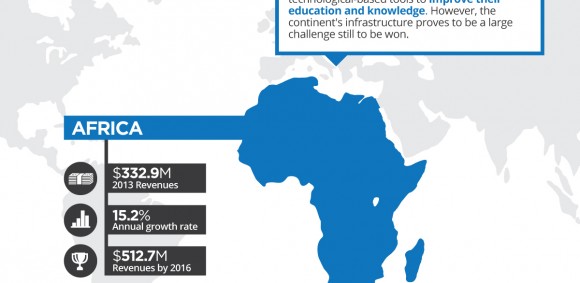2014-2016 E-learning Market Trends — African E-learning Market
Self-paced eLearning revenues in Africa reached USD250.9 million in 2011 and will more than double to USD512.7 million by 2016,according to a new Ambient Insight report called,“The Africa Market for Self-paced eLearning Products and Services: 2011-2016 Forecast and Analysis.
While e-learning is typically associated with high-end devices and internet connections,with the recent arrival of fiber optic connectivity,which has been a major learning technology catalyst in Africa. Africa is the most self-motivated eLearning market in the world. In the recent years,many countries in Africa have embarked on new government-backed initiative,regional and international support to integrate learning technology into education and corporate training.
Africa has the highest growth rates in the world for four out of the five self-paced e-learning products and services,including packaged content,custom content development services,cloud-based authoring tools and learning platform services,installed authoring tools,and installed learning platforms.
The overall growth rate for self-paced e-learning in Africa is 15.2%. Senegal has the highest growth rate in Africa at 30.4%,followed by Zambia,Zimbabwe,Kenya and Nigeria at 27.9%,25.1%,24.9% and 23.3% respectively.

There are several drivers of this development in Africa:
the recent arrival of fiber optic connectivity. Prior to this,satellite access was the primary connectivity medium,which is very expensive. This was inhibiting the uptake of Internet connectivity
a price war with telecoms and ISPs dropping prices to attract customers. This has also created a boom in the adoption of Internet and mobile technologies
Internet penetration in Kenya essentially doubled from 2010 to 2011,growing from 28% to 52% in just one year. Internet penetration more than tripled in Rwanda between 2011 and 2012,growing from 8% to 26% in one year.
The wide scale digitization of academic content in every country analyzed in this report
The explosion of online enrollments in higher education institutions
the sharp spike in the adoption of eLearning in the corporate segments in the booming economies.
National governments are not the only ones playing a key role in the development of information and communication technologies (ICT) for education. Other sponsors of this trend are international authorities,such as UNESCO,which invests heavily in developing a modern framework for education in the region. Most of these initiatives are vertical,like UNESCO’s initiative to disseminate the important role women have played in African history.
However,the development of a mature E-Learning market in Africa is still restricted by the lack of proper IT infrastructures and connectivity solutions. According to 2012 estimates,Internet penetration in Africa has reached only 15.6%.
Although the number of people on whom the internet has an impact is undoubtedly higher,this statistic demonstrates a significant infrastructural disparity between Africa and the other continents. Today,the fast-growing market for mobile devices looks to be the strongest trend that will support the development of E-Learning in Africa.